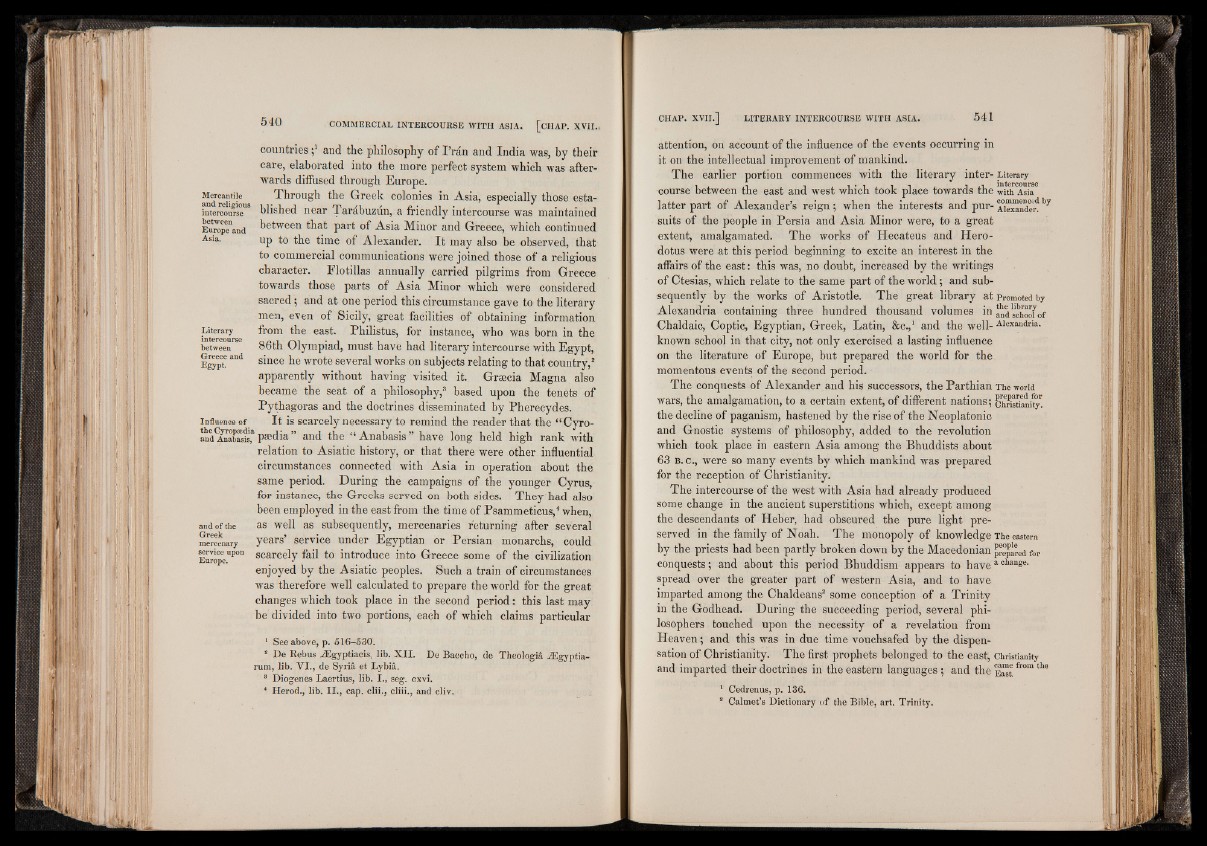
countriesand the philosophy of I ’ran and India was, by their
care, elaborated into the more perfect system which was afterwards
diffused through Europe.
Mercantile Through the Greek colonies in Asia, especially those estaintercourse
™ blished near Tarabuzun, a friendly intercourse was maintained
EiSopTand between that part of Asia Minor and Greece, which continued
Asia. up to the time of Alexander. It may also be observed, that
to commercial communications were joined those of a religious
character. Flotillas annually carried pilgrims from Greece
towards those parts of Asia Minor which were considered
sacred; and at one period this circumstance gave to the literary
men, even of Sicily, great facilities of obtaining information
Literary from the east. Philistus, for instance, who was born in the
between 86th Olympiad, must have had literary intercourse with Egypt,
Greece and s;ncc pe wrote several works on subjects relating to that country,8
apparently without having visited it. Graecia Magna also
became the seat of a philosophy,3 based upon the tenets of
Pythagoras and the doctrines disseminated by Pherecydes.
influence of It is scarcely necessary to remind the reader that the “ Cyroand^
Anabasksfpsedia” and the “ Anabasis” have long held high rank with
relation to Asiatic history, or that there were other influential
circumstances connected with Asia in operation about the
same period. During the campaigns of the younger Cyrus,
for instance, the Greeks served on both sides. They had also
been employed in the east from the time of Psammeticus,4 when,
and of the as well as subsequently, mercenaries returning after several
mercenary years’ service under Egyptian or Persian monarchs, could
EuropeUp°D scarcety to introduce into Greece some of the civilization
enjoyed by the Asiatic peoples. Such a train of circumstances
was therefore well calculated to prepare the world for the great
changes which took place in the second period: this last may
be divided into two portions, each of which claims particular
1 See above, p. 516-530.
2 De Rebus iEgyptiaeis. lib. X I I . De Baecho, de Theologia iEgyptia-
rum, lib. V I., de Syria et Lybid.
‘ Diogenes Laertius, lib. I., seg. cxvi.
4 Herod., lib. I I ., cap. clii., cliii., and cliv.
attention, on account of the influence of the events occurring in
it on the intellectual improvement of mankind.
The earlier portion commences with the literary inter- Literary
• intercourse course between the east and west which took place towards the with Asia
latter part of Alexander’s reign; when the interests and pur- Alexander.by
suits of the people in Persia and Asia Minor were, to a great
extent, amalgamated. The works of Hecateus and Herodotus
were at this period beginning to excite an interest in the
affairs of the east: this was, no doubt, increased by the writings
of Ctesias, which relate to the same part of the world; and subsequently
by the works of Aristotle. The great library at Promoted by
Alexandria containing three hundred thousand volumes in lnd school'of
Chaldaic, Coptic, Egyptian, Greek, Latin, &c.,‘ and the well- Alexandria,
known school in that city, not only exercised a lasting influence
on the literature of Europe, but prepared the world for the
momentous events of the second period.
The conquests of Alexander and his successors, the Parthian The world
wars, the amalgamation, to a certain extent, of different nations; Christianity!
the decline of paganism, hastened by the rise of the Neoplatonic
and Gnostic systems of philosophy, added to the revolution
which took place in eastern Asia among the Bhuddists about
63 b . c., were so many events by which mankind was prepared
for the reception of Christianity.
The intercourse of the west with Asia had already produced
some change in the ancient superstitions which, except among
the descendants of Heber, had obscured the pure light preserved
in the family of Noah. The monopoly of knowledge The eastern
by the priests had been partly broken down by the Macedonian p“ £area for
conquests; and about this period Bhuddism appears to haveaohange-
spread over the greater part of western Asia, and to have
imparted among the Chaldeans8 some conception of a Trinity
in the Godhead. During the succeeding period, several philosophers
touched upon the necessity of a revelation from
Heaven; and this was in due time vouchsafed by the dispensation
of Christianity. The first prophets belonged to the east, Christianity
and imparted their doctrines in the eastern languages; and the from 1116
1 Cedrenus, p. 136.
2 Calmet’s Dictionary of the Bible, art. Trinity.